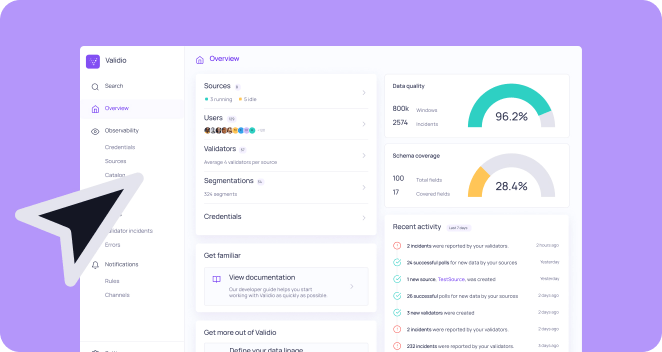Joining a +15 strong high performing engineer team as the first commercial hire has been exhilarating, educational, intellectually stimulating and not going to lie, sometimes a bit overwhelming (you all know how the first weeks at a new job are).
But who am I? My name is Richard and I recently joined Validio as Growth and Commercial Strategy Lead — supporting our founders to set our GTM & commercial operations and build the basis for scaling Validio’s data quality platform globally.
I am an engineer by training and majored in financial engineering and mathematical modeling. My previous experience includes a stint with the biz dev team at Google Cloud prior to joining Bain where I worked with corporate strategy and most recently as CxO for an internal machine learning startup where we scaled it from pilot phase to $1M ARR in 12 months.
I’m really excited to have joined the team and look forward to scaling Validio to $1M ARR and beyond.
While working with our internal machine learning startup at Bain, it became evident to me that we’ve crossed the chasm when it comes to recognizing the importance of data quality. The data volumes, data variety and data sources have exploded during the past years — necessitating solutions to automatically monitor and validate the quality of data in the context of the modern cloud data infrastructure.
As Andrew Ng famously stated last year: “If 80 percent of our work is data preparation, then ensuring data quality is the important work of a machine learning team”
Beyond this realization, why join Validio and the mission to build a category-defining data quality platform? As they say, all good arguments come in three:
1. An opportunity with perfect timing
Every organization today is aspiring to become data-driven. Establishing end-to-end data infrastructures has historically been a costly and time-consuming endeavor requiring millions of dollars of investment and months, or even years of deployment. With the rise of cloud data warehouses and the modern data stack the promise of big data has truly been unleashed during the past few years.
Any company, no matter size, can become a data company today. A company migrating to the modern data stack means a company poised to meet the varying demands of modern data. The modern data stack seeks to overcome the problems and challenges associated with modern data while enabling an organization to innovate and automate like never before.
Subsequently, as companies of all sizes process, store and utilize more data than ever before, modern ML-based data quality solutions going beyond manual rule-based settings are increasingly moving towards becoming a hygiene factor in the modern data stack. Don’t take my word for it, respondents in the 2022 Data Engineering Survey (mostly data engineers) cited data quality and validation as their #1 problem. Furthermore, 27% of the survey respondents were unsure what (if any) data quality solution their organization uses. That number jumped to 39% for organizations with low DataOps maturity.
All told, the time to act is now. From what I’ve been able to garner from my VC friends, the question: ‘Why now?’ might be one of the hardest questions VCs may ask startups; needless to say I feel we at Validio have that one covered.
2. An international and exceptionally seasoned team
The talent Validio has been able to attract is really impressive. Senior and seasoned developers from all over the world with +10 years of average experience along with reputable investors and advisors have vouched for the founding team with their career, time and money.
There are few Nordic seed-stage startups that have a team roster with the technical experience and logos that Validio has — the saying that good people attract good people really shines through here.
Combining this with Validio’s ambition to build a global category leader made the opportunity to join even more compelling.
In the process of deciding whether to join a start-up, the number one deciding factor to consider should in my opinion always be the team. A strong and ambitious team combined with a very real and global problem being solved is not a sufficient, but indeed a necessary condition for scaling a startup successfully.
3. A truly differentiated data quality platform
There are a number of reasons as to why I believe our platform is truly differentiated — our CEO and co-founder Patrik discusses a number of them here (man I wish he would have written it three month earlier, it would have saved me a lot of headache during my due diligence process).
During the interview process the founders told me how 18 months ago, everyone asked how Validio differed from what can now be considered ‘legacy data quality tools’; Tools that were designed for a different era than the modern data stack, such as Informatica Data Quality (released in 2001), Talend (released in 2005) or Oracle Enterprise Data Quality. From being virtually non-existent, the modern data quality space quickly took off in the second half of 2020 hosting multiple companies with a collective funding of over $200M raised in the past 18 months. Subsequently, the conversations have shifted to the differentiation between these new emerging solutions.
The absolute majority of these new data quality tools that have emerged during the past 18 months focus on either monitoring data at rest through data warehouse SQL queries or monitoring only pipeline metadata.
Validio has been built to have the ability to validate and monitor both streaming and batch data pipelines in real-time — enabling proactive identification and mitigation of data quality issues and unknown data failures. Validio also hosts a couple of features unique to Validio, including ability to provide real-time auto-resolutions to bad data, apply rich multivariate data quality analysis and partition the data before analysis. The platform also analyses actual data on both datapoint and dataset level, in addition to also monitoring pipeline metadata.
Validio is built for modern data teams looking for a data quality platform that they can grow and scale with as they become increasingly data-driven. The vision and differentiation we’re applying to solve the data quality problem at scale in the context of the modern data stack is truly exciting. The opportunity is massive and we’ve barely scratched the surface.
In summary
In today’s digital world, data experts, consultants and business leaders alike have declared data as one of the most valuable business resources. Companies that manage to unlock the value of their datasets will leap miles ahead of their competition. To remain competitive, data-driven market leaders are making data quality a top priority. Data quality is essential for any kind of analytical system, regardless of it being plain old reporting, BI, operational analytics or advanced real-time machine learning
I’m personally very excited about what the future holds for the data space and all the new products, customer experiences and business models it unlocks and enables.
If you are active in the space or know a data team that could benefit from a data quality platform built for modern data teams — let’s chat! :)



